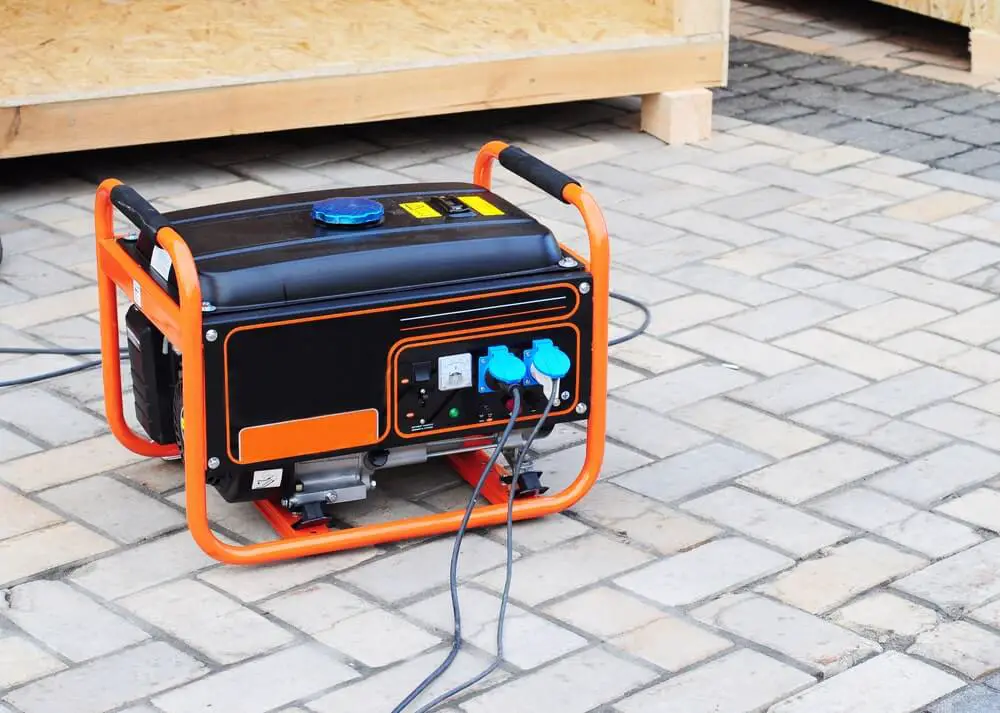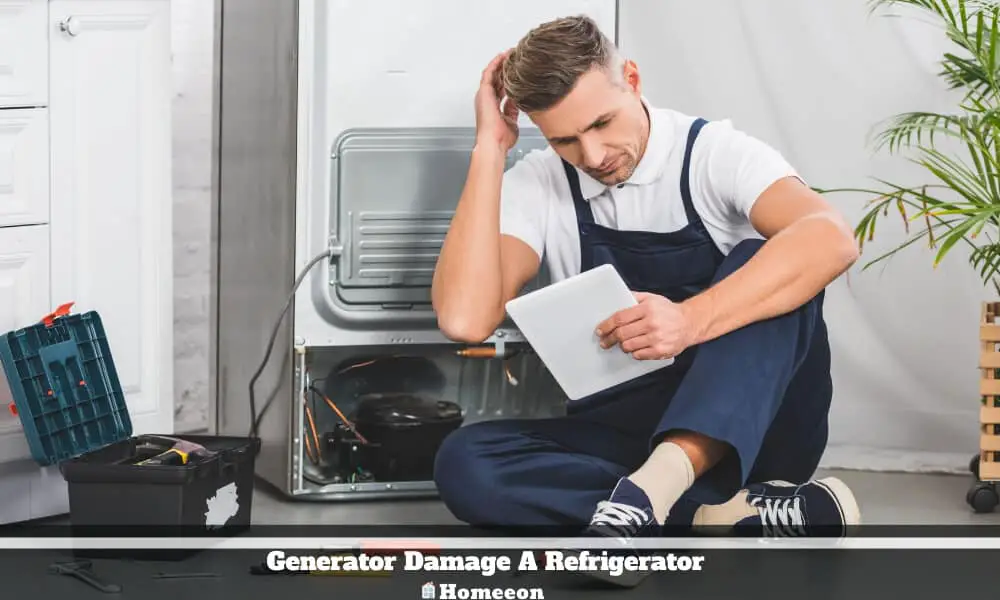Last Updated on August 5, 2023 By Emma W. Thomas
Yes, a generator can potentially damage a refrigerator if it doesn’t provide stable and clean power. Electrical fluctuations or surges from a generator can harm the refrigerator’s sensitive components. Using a quality voltage regulator or surge protector can help prevent such damage.
Why Can A Generator Damage Your Refrigerator?

If your generator is overloaded and you connect the refrigerator, it will damage both devices. A refrigerator has a thermostat that makes the compressor switch on and off to retain the correct temperature. If the power is not enough to switch on and off the fridge over a long period, it will damage it.
Even if you switch on the fridge before other gadgets, the power consumption goes up anytime the thermostat starts the compressor. You need to consider the starting watts and use these as the running watts.
Is It Safe To Run Your Refrigerator On A Generator?
Running your refrigerator on a generator can be a necessity during power outages or when camping in remote areas. However, before connecting your fridge to a generator, it’s crucial to consider various factors to ensure the safety of the appliance and yourself. In this listicle, we will discuss the key points you should keep in mind when running your refrigerator on a generator.
- Generator Capacity:
One of the most important factors to consider is whether your generator has enough capacity to power your refrigerator. Refrigerators typically require a higher starting wattage than their running wattage. Check your fridge’s manual or sticker for its wattage rating, and ensure that your generator can handle it. Running a refrigerator on an underpowered generator can damage both the appliance and the generator. - Sine Wave Output:
Generators come in two types: conventional and inverter. Conventional generators produce an inconsistent power output, which may harm sensitive electronic devices like refrigerators. Inverter generators, on the other hand, provide a clean and stable sine wave output, making them a better choice for running appliances like refrigerators. They can safely handle the fridge’s compressor and other electronic components without risking damage. - Grounding:
Proper grounding is essential when running your refrigerator on a generator. Ensure that your generator is properly grounded and follows the manufacturer’s guidelines. Grounding helps prevent electrical shocks, protects your equipment, and reduces the risk of fire hazards. - Extension Cords and Connections:
When connecting your refrigerator to a generator, always use heavy-duty extension cords that are rated for the load. This ensures that the current flows smoothly and minimizes the risk of overheating or voltage drops. Additionally, make sure all connections are secure and waterproof to avoid any electrical shorts or accidents. - Placement and Ventilation:
Ensure that your refrigerator is placed in a well-ventilated area when running it on a generator. Proper air circulation is necessary for the appliance to work efficiently and prevent overheating. Avoid placing the generator or refrigerator near flammable materials like curtains, and make sure there is enough space between them to facilitate adequate ventilation. - Load Management:
Running multiple appliances simultaneously on a generator can overload its capacity. If you plan to run other devices along with your refrigerator, calculate the total power requirement and ensure that your generator can handle the load. Overloading the generator can damage both the generator and the connected appliances, including your refrigerator. - Maintenance and Inspection:
Regularly inspect your generator for any signs of wear and tear, loose connections, or damaged parts. Follow the manufacturer’s recommended maintenance schedule and perform routine checks to ensure the safe and efficient operation of your generator. A well-maintained generator is less likely to cause electrical hazards or unexpected failures. - Safety Precautions:
While running your refrigerator on a generator, always prioritize safety. Keep flammable materials away from the generator and never operate it indoors, as generators emit harmful exhaust gases like carbon monoxide. Place carbon monoxide detectors in your home or camping area to ensure early detection of any potential danger.
The Number Of Watts That A Refrigerator Needs
Each refrigerator is different and has unique wattage requirements. When you buy a fridge, it is necessary to check the manufacturer’s manual and get the correct information. You need to get the information on the refrigerator’s starting and running watts.
Starting (or surge) wattage refers to the amount of energy needed to power a freezer and refrigerator. Running (rated) wattage is the energy that is necessary to run your device continuously after the initial startup. Depending on the size, a home refrigerator requires between 1000-2000 starting watts.
A generator that delivers a minimum of 2000w as starting power is ideal for running both the fridge and freezer without any issues. It is, however, essential to purchase a generator that is slightly larger to be safe. A larger device can also be sufficient to run other appliances such as a TV and lighting circuits in your home.
Best Portable Generator For A Refrigerator
An ideal generator needs to accommodate both your fridge and other household items. You can get a dual-fuel generator that uses both gasoline and propane since propane is cheaper. An inverter generator is also perfect since it is more portable, quieter, and safer to use. You can use it to power sensitive modern appliances such as laptops, TVs, and home audio systems.
Tips For Caring For Your Generator
You need to take proper care of your generator to prevent damaging your refrigerator and other household appliances. The following tips are helpful;
Avoid The Garage
Never operate your generator inside or close to an open garage. You should also not start a portable generator inside the house as this may cause the risk of poisonous carbon monoxide invading your home. Make sure that the device is at least 15 feet away from your house.
Do not place the device near open windows, including your neighbor’s.
Read The Manual
Your generator’s manufacturer’s manual provides the necessary information that you need to maintain it in good condition. It will also help you know how to use this machine for many years correctly and keep it in proper working condition.
Using The Right Type Of Engine Oil
Make sure that you use the appropriate engine oil and change it as per the manufacturer’s specifications. You can look for oil that is recommended for all-temperature and general-purpose.
Right Connection
Never connect a generator directly to an electric outlet in your home using a power cord. Doing this will cause the power to back feed into the utility lines that run into the house. The back feed can be dangerous to an electrician who may come to restore power in the neighborhood.
Use Of Proper Power Cord
A portable generator’s power is measured in watts while a power cord is measured in amps. You need to select a power cord that is compatible with the most powerful outlet on the generator. If the outlet has 50-amp, you need to buy a power cord that is also 50-amp. A heavy-duty cable that is less than 100 feet and at least 12 gauge is ideal.
Powering The Appliances
Your appliances can damage the generator if not correctly plugged in. Make sure that you start the generator and allow it to run shortly before you can plug in the devices. When plugging in, please switch off the appliances and plug them at different times. Allow each machine to power up and become stable before you can plug in another device.
Do Not Overload
A refrigerator that runs on 800 watts may require 1600 watts for the startup. If you overload your generator, it could damage your appliances. Avoid unnecessary running of devices and other electronic equipment. If your appliance’s wattage is not provided, you can get it by multiplying its volts by amps.
Refuelling The Generator
Do not refuel a generator that is still running or whose engine is still hot. Doing this may cause the heat from the exhaust or engine parts to ignite the gasoline. You need to put it off and allow it to cool for about 10 minutes before refueling.
Change The Oil During Prolonged Outages.
It is advisable to change your generator’s oil during prolonged power outages. You need to check the owner’s manual for the right intervals for changing. If your equipment has no hour meter that shows how long it has been running, try keeping track. Try to preserve the fuel by plugging in essential appliances and turning off the machine overnight.
How Often Should You Run The Generator To Keep The Refrigerator Cold?

If your refrigerator is not opened, it keeps food cold for at least four hours. Your freezer, on the other hand, keeps foodstuff safely cold for about forty-eight hours when full and closed. The food will remain cold inside the freezer for at least twenty-four hours if it is half-full and unopened.
Your refrigerator can remain unplugged as long as the temperature is 40 degrees or less. If the temperatures rise above this range, then you can run the generator.
Conclusion
A generator can damage your refrigerator if it does not have the right wattage. Before powering your refrigerator using the generator, make sure that it can accommodate the appliance’s startup watt as this is what matters most. Avoid overloading the machine also since doing this will not only spoil your refrigerator but can also damage the generator itself.
Always look at the owner’s manual of your refrigerator before plugging it into the equipment to ensure that the wattage is right. Practice safety measures to care for your generator as this will help to prevent damaging your appliances.
References:
https://generatorist.com/can-a-generator-damage-a-refrigerator-safety-tips-more
https://refrigeratorblog.com/can-a-generator-damage-a-refrigerator/
Emma is a graduate of Domestic Science or Family and Consumer Sciences (Home Economics) from the University of Wisconsin. She has 7 years of experience Working with the strategic section of BestBuy and now writing full-time for Homeeon.
From Managing the Home, Interiors, Cleaning, and Exteriors to Gardening and everything about Making A Home Liveable – is her passion and this Homeeon is the result of this.
Emma loves decorating her home with the best stuff found online. She cares about quality over anything and writes reviews about them here in Homeeon. Get in touch with her over Pinterest.
Keep reading her blogs.
